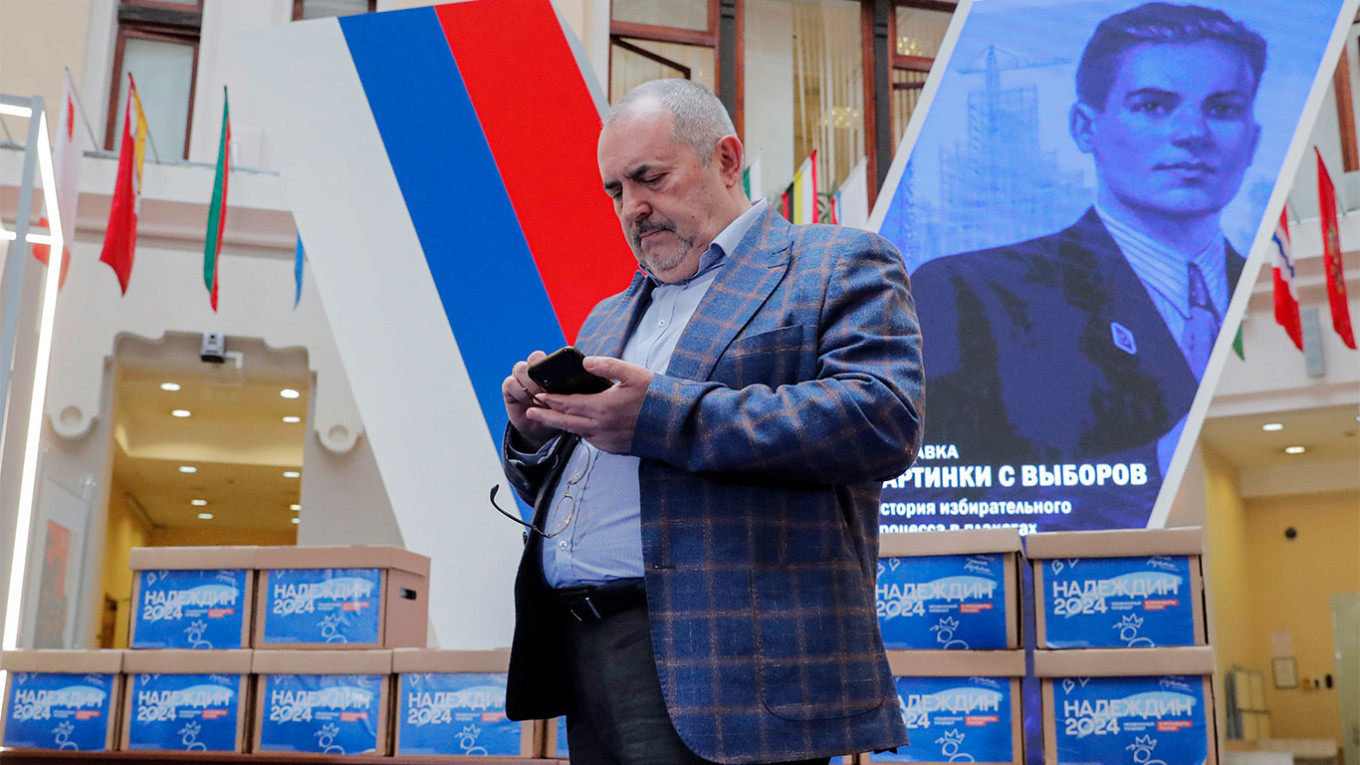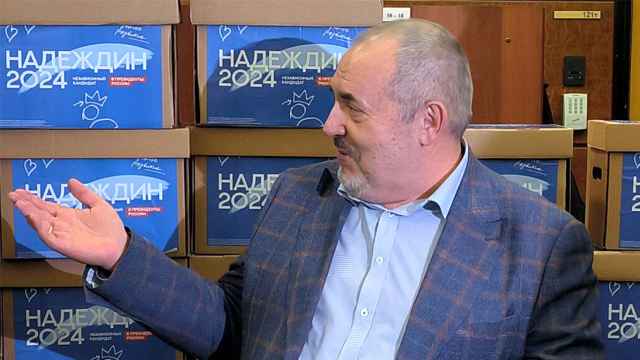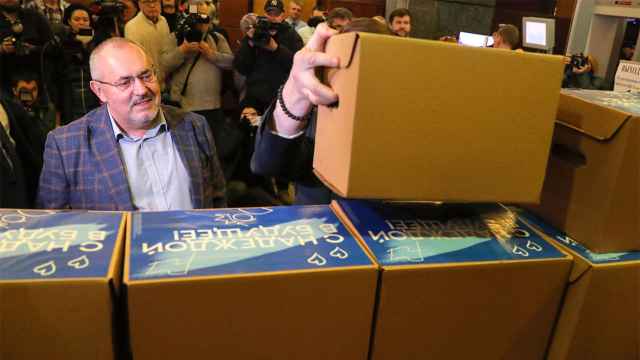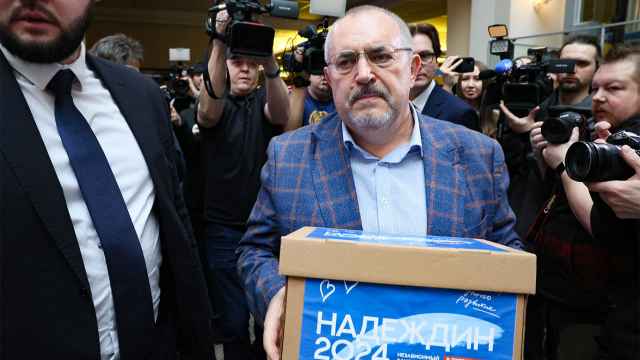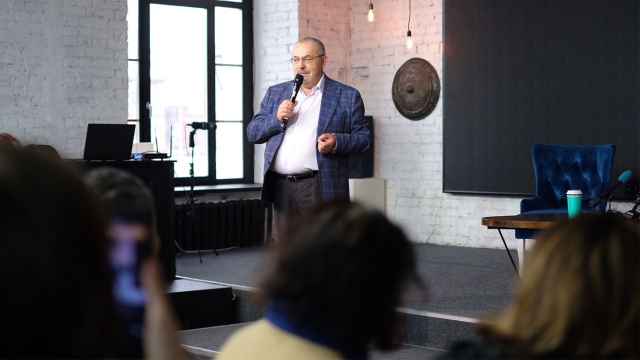Russian election authorities on Thursday disqualified pro-peace presidential hopeful Boris Nadezhdin from the March election over alleged errors in his endorsement signatures.
The veteran politician's campaign has presented a rare challenge to a tightly controlled election in which President Vladimir Putin is likely to win a fifth term, with thousands of Russians lining up to endorse his pro-peace bid in recent weeks.
Though the Kremlin has said it does not view Nadezhdin as a rival to Putin, the Kremlin gave the order to reject Nadezhdin’s candidacy, two Russian officials involved in organizing the presidential election told The Moscow Times.
“The fact that we saw lines of support on the streets of Russian cities was an unpleasant surprise for the Kremlin. After that, participation in the election was a foregone conclusion,” a source close to the Kremlin told The Moscow Times on condition of anonymity because he is not authorized to speak to journalists.
Another Russian official told The Moscow Times that the Kremlin initially believed that Nadezhdin's campaign could “revitalize” the election and make Putin's victory more exciting.
“But these lines have irritated senior Kremlin officials,” said the insider, who also agreed to speak on condition of anonymity. “We should have only one politician who is publicly loved by the people. That's the boss [Putin].”
Nadezhdin’s campaign had submitted 105,000 signatures to the Central Election Commission (CEC), which later said that 15% of them contained flaws, including “dead souls” and invalid signatures.
Russian law requires prospective candidates running from a party without representation in parliament to collect 100,000 signatures of endorsement.
A slideshow presented at the CEC’s live session showed 9,147 invalid signatures (out of randomly selected 60,000 signatures) and 95,587 valid signatures of endorsement for Nadezhdin.
“That’s not enough to register a candidate,” CEC member Andrei Shutov said.
Nadezhdin had said his campaign would need to prove the validity of 4,500 signatures to be eligible to run in the presidential race next month. His campaign was able to prove the validity of just 63 signatures.
The CEC had invalidated 3,000 signatures due to inconsistencies among collectors, 360 signatures collected by members of election offices and 11 signatures of deceased persons.
Russia’s Interior Ministry had also invalidated 858 of Nadezhdin’s signatures.
The pro-peace presidential hopeful said he plans to appeal the CEC's decision with Russia’s Supreme Court.
But according to Stanislav Andreychuk, who serves as a board member of the independent election watchdog Golos, Nadezhdin's appeal will stand “almost no chance” in court.
“It’s impossible to challenge the conclusions of handwriting experts, [who verify endorsement signatures],” Andreychuk told The Moscow Times. “You have to take their word for it.”
“This is very convenient for arbitrarily denying registration, and it essentially deprives candidates of their right to effective judicial protection,” he added.
At Thursday's session, Nadezhdin asked the CEC to postpone the signature review to give his team more time to sort through the errors.
“Tens of millions want to vote for me, and you’re telling me about 11 ‘dead souls’,” he said.
However, CEC chief Ella Pamfilova declined his request.
After election authorities voted unanimously to bar Nadezhdin from running in the March race, Pamfilova urged the presidential hopeful to create his own political party, adding that he has “a promising political outlook.”
According to experts, Russian election laws provide ample opportunities for authorities to arbitrarily block would-be candidates from running for office.
“In recent years, the process of collecting signatures [of endorsement] has been made as difficult as possible... increasing the chance that signatures will be rejected on arbitrary grounds,” Andreychuk said.
While Nadezhdin's expected appeal to the Supreme Court may be doomed to failure, some analysts say the move is still important as it shows to his supporters that he will not allow himself to be blocked from running without using all channels available to him.
“This is crucial to prevent people from feeling abandoned. Politically, this [the appeal] is a correct and necessary step,” said political scientist Yekaterina Schulmann.
Nadezhdin, 60, who hopes to run as a candidate from the Civic Initiative party, has seen a surge of support over the past month.
His campaign manifesto states that he is running as “a principled opponent of the policies of the current president." It adds that he is against “unjustified use of military force against other countries” and for “cooperation with Western countries.”
Long lines formed outside his campaign offices both inside Russia and abroad as thousands of pro-peace Russians hoped to safely express their opposition to the war in Ukraine by endorsing his election bid.
According to Schulmann, even in tightly controlled political systems like Russia, it is still crucial “to create an impression” and “to show how large the demand for an alternative [candidate] is.”
“This is a gamble for impression, not for an outcome,” she said, but emphasized that "the actual outcome remains firmly in control of the [election] organizers, making it impervious to influence by the citizens.”
“We’ve seen the long lines for Nadezhdin, there was enthusiasm, and his regional headquarters were self-organizing as genuine grassroots initiatives. The incumbent [Putin] could not pull off anything like that.”
Schulmann noted that, as the election campaign is not officially over, Nadezhdin still has “some room for maneuver.”
“Will he call on his supporters to take some form of electoral action? Will he try to transfer his potential votes to one of the registered candidates?”
Meanwhile, Sergei Malinkovich, another non-parliamentary hopeful from the Communists of Russia party, was disqualified during the same CEC session on Thursday.
He declined to appeal the disqualification.
The CEC officially registered four candidates for the March presidential race — current President Vladimir Putin, Leonid Slutsky of the far-right Liberal Democratic Party, Nikolai Kharitonov of the Communist Party and Vladislav Davankov of the New People party.
A Message from The Moscow Times:
Dear readers,
We are facing unprecedented challenges. Russia's Prosecutor General's Office has designated The Moscow Times as an "undesirable" organization, criminalizing our work and putting our staff at risk of prosecution. This follows our earlier unjust labeling as a "foreign agent."
These actions are direct attempts to silence independent journalism in Russia. The authorities claim our work "discredits the decisions of the Russian leadership." We see things differently: we strive to provide accurate, unbiased reporting on Russia.
We, the journalists of The Moscow Times, refuse to be silenced. But to continue our work, we need your help.
Your support, no matter how small, makes a world of difference. If you can, please support us monthly starting from just $2. It's quick to set up, and every contribution makes a significant impact.
By supporting The Moscow Times, you're defending open, independent journalism in the face of repression. Thank you for standing with us.
Remind me later.





